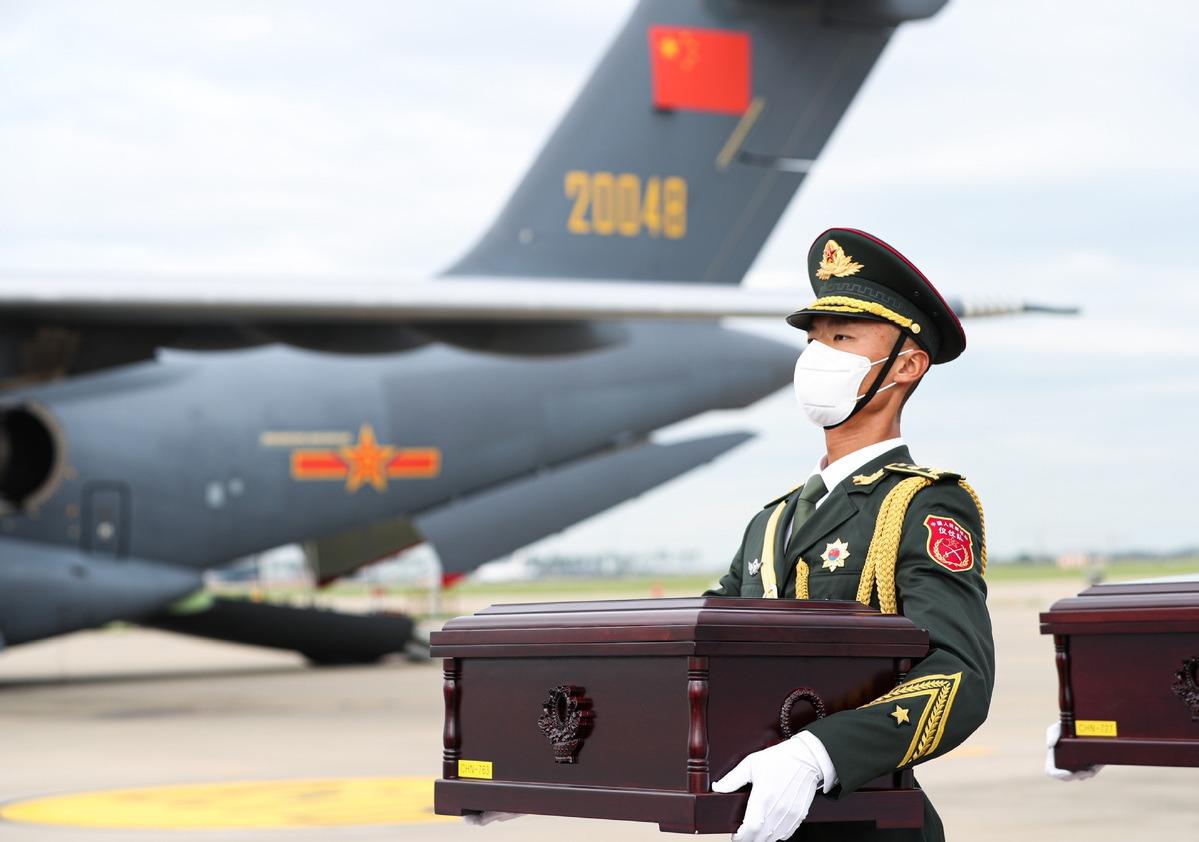Editor's note: July 27 marks the 70th anniversary of the victory of the War to Resist US Aggression and Aid Korea (1950-53). The anniversary should be commemorated to highlight the importance of peace, laud the decision of the then leaders which in the long run helped the country's development, and pay respects to the Chinese People's Volunteers force for making great sacrifices to defend the motherland. Three experts share their views on the issue with China Daily.
 A Chinese soldier carries a coffin containing remains of Chinese People's Volunteers martyrs killed in the 1950-53 Korean War during a repatriation ceremony at Incheon International Airport in Incheon, South Korea, Sept 2, 2021. (PHOTO / XINHUA)
A Chinese soldier carries a coffin containing remains of Chinese People's Volunteers martyrs killed in the 1950-53 Korean War during a repatriation ceremony at Incheon International Airport in Incheon, South Korea, Sept 2, 2021. (PHOTO / XINHUA)
July 27 marks the 70th anniversary of the armistice agreement that put the Korean War (1950-53) on hold.
Eight months after the founding of the People's Republic of China, the Korean War broke out in June 1950. The flames of war soon reached the border river of Yalu, and US planes repeatedly bombed Northeast China's border regions. On Oct 19, 1950, responding to the Democratic People's Republic of Korea's request for assistance the Chinese People's Volunteers force crossed the Yalu River to aid the DPRK's fight there until the armistice was signed in 1953.
Some people have questioned China's decision to aid the DPRK and resist US aggression, and have questioned whether the cost in lives was worth it. It is not difficult to answer these questions if we consider the situation at that time.
It was at the request of the DPRK that China's leadership decided to send the Chinese People's Volunteers force to the peninsula. China also had to safeguard its own national security. With the intervention of Washington, the fighting did not stop at the 38th Parallel, along which a buffer or demilitarized zone had been established. As the US bombed cities and towns on the border between China and the DPRK, it posed a threat to China's national security, with some in the US calling for the war to be extended into China.
Since the expansion of the war into China would have had severe consequences for the newly founded People's Republic, Chairman Mao Zedong announced that China needed to restore peace on the Korean Peninsula.
Some people think the hostilities ended a stalemate because after the signing of an armistice, the two sides returned to their respective pre-war positions separated by the 38th Parallel. But the fact that the ill-equipped Chinese People's Volunteers force, which made huge sacrifice during the war, did not retreat in face of the US-led forces, which had the most advanced weapons and equipment, shows that the Chinese side was the victor in the war. When the fighting finally ceased around the 38th Parallel, the Chinese volunteers force had advanced about 300 kilometers from the China-DPRK border, at one stage even reaching near the 37th Parallel.
By participating in the war, China succeeded in building a peaceful environment that boosted the morale of the Chinese people and facilitated the country's economic development. China repeatedly warned the US-led forces preparing to cross the 38th Parallel to continue their offensive that the Chinese people love peace but are not afraid to fight a war against aggression, and it would take counteraction if the US forces crossed that line.
Washington ignored these warnings as it believed that Beijing had neither the ability nor the courage to confront the powerful, well-equipped US-led forces.
By pushing the US-led forces back to the 38th Parallel from close to the Yalu River and exacting an armistice from the US, the Chinese People's Volunteers force demonstrated its brave spirit and excellent tactics, and created a significant strategic buffer zone for the country. If China had not won the war, it would have faced great military pressure with the US forces crossing the Yalu River.
China paid a great price by being forced to participate in a war to resist US aggression and it won the peace alongside the DPRK, safeguarding its territories, creating opportunities for its economic development and peaceful rise.
By fighting the war, China also minimized the risks of military attack or military interference in its internal affairs at the height of the Cold War. Therefore, China should commemorate the victory of the War to Resist US Aggression and Aid Korea and laud the Chinese leadership at that time for making the hard but wise decision that in the long run was crucial for the country's development, and appreciate the great sacrifices of the Chinese People's Volunteers force and civilians. Over 197,000 Chinese people had died in the war.
The War to Resist US Aggression and Aid Korea showed that although China is a peace-loving country, it will not hesitate to fight if forced to safeguard its territories and protect its people.
Some countries led by the US are hyping up the "China threat" theory nowadays as part of their strategy to contain China. China is not a threat to any country, it pursues a defensive policy. However, should its sovereignty, national security and development interests be threatened, the spirit of the Chinese People's Volunteers force will inspire the people to firmly defend the motherland.
The author is the director of the academic council and a senior research fellow at the Shanghai Center for Rim-Pac Strategic and International Studies.
The views don't necessarily represent those of China Daily.



